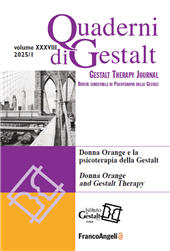La SIPG racconta : la storia della psicoterapia della Gestalt Italiana. Anna Fabbrini e il Centro Alia
85-103 p.
L'intento di questo articolo è di ripercorrere, attraverso le parole e lo sguardo dell'autrice, parte della storia della psicoterapia della Gestalt italiana: una testimonianza incarnata che, partendo da esperienze e ricordi personali, ci aiuta a comprendere le radici dell'approccio gestaltico in Italia e che ci orienta nel nostro presente. Il saggio fornisce una ricchissima selezione di testi e autori che sono stati fondamentali per lo sviluppo della psicoterapia in generale e per la psicoterapia della Gestalt in particolare. L'autrice ci conduce in questo viaggio di memoria attraverso gli incontri, le parole dei maestri, le esperienze formative e cliniche, i sodalizi e le collaborazioni. Emerge uno sguardo sempre orientato alla cura (anche del terapeuta), all'etica della relazione, alla curiosità e al rispetto delle differenze senza mai dimenticare il contesto, le appartenenze, lo spirito del tempo e il clima sociale. [Testo dell'editore]
The aim of this article is to retrace a part of the history of Gestalt therapy in Italy, through the author's eyes and in her own words: an "embodied" account that, starting from her own experiences and developments, helps us to understand the roots of the Gestalt approach in Italy and guide us to navigate our present. The essay provides a vast selection of texts and authors that have been key for the professional and personal development of the author and that could become a useful tool for the new generations of psychotherapists too. It is an opportunity to nurture our own ground and to foster our own humanity. The author takes us on a trip down memory lane through her encounters, her mentors' words, her formative experiences through her clinical and supervision work, her collaborations and her partnerships. Gestalt psychotherapy in Italy places itself as a distinct approach thanks to tireless reasearch, an open conversation with other approaches, the establishment of a federation of
institutes and of an association of individuals, and an environment where mutual recognition is available and where common criteria can be established while respecting differences. What emerges is a gaze that is always oriented toward caring (including the therapist), the ethics of relationship, curiosity and respect for differences without ever forgetting context, affiliations, the spirit of the times and the social climate. This essay has the ability to convey hope that psychotherapy can lead to the humanization of these troubled times and can provide a chance to become aware and acknowledge complexity. [Publisher's text]
-
Articles from the same issue (available individually)
-
Information
ISSN: 2035-6994
DISCIPLINES
KEYWORDS
- storia della Gestalt, formazione, crescita professionale, psicoterapia
- History of Gestalt, training, professional growth, psychotherapy


